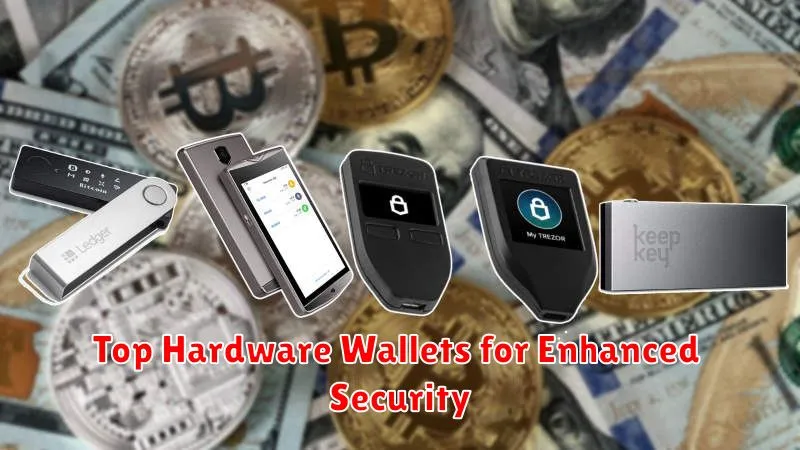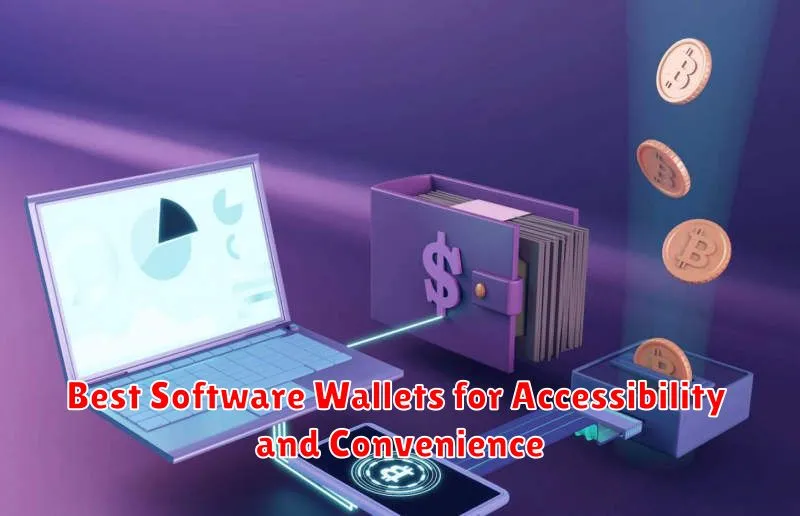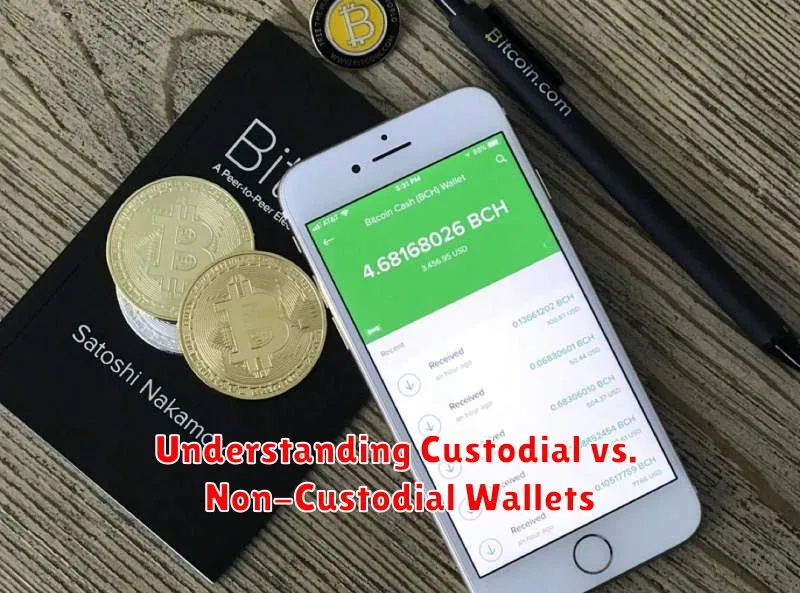In the ever-evolving world of cryptocurrency, securing your digital assets is paramount. Choosing the right cryptocurrency wallet is crucial for safeguarding your precious investments. With a plethora of options available, finding the perfect fit for your needs can feel overwhelming. This comprehensive guide will delve into the best cryptocurrency wallets of 2024, highlighting their key features, security measures, and user-friendliness. Whether you’re a seasoned crypto enthusiast or just starting your journey, this article will equip you with the knowledge to make an informed decision.
From hardware wallets offering the highest level of security to software wallets providing convenience and accessibility, we’ll explore the different types of wallets and their advantages. We’ll also analyze factors like supported cryptocurrencies, fees, and user interface to help you choose the ideal wallet that aligns with your specific requirements. Join us as we navigate the exciting landscape of cryptocurrency wallets and empower you to store and manage your digital assets with confidence.
What is a Cryptocurrency Wallet?

A cryptocurrency wallet is a software program that allows you to store, send, and receive cryptocurrencies. It’s not a physical wallet where you keep your coins, but rather a digital tool that holds your private keys. These private keys are essential for accessing and controlling your crypto assets.
Think of a cryptocurrency wallet as a digital bank account for cryptocurrencies. It has an address, similar to a bank account number, that you can use to receive cryptocurrency from others. You can also use your wallet to send cryptocurrencies to others, but for security purposes, you’ll need to know the recipient’s address.
There are several different types of cryptocurrency wallets available, each with its own unique features and benefits. Some of the most popular types include:
- Software wallets: These are downloadable applications that you can install on your computer or mobile device. They are generally considered to be more secure than web wallets, as they are not connected to the internet.
- Web wallets: These are wallets that you access through a web browser. They are convenient but can be less secure than software wallets, as they are connected to the internet.
- Hardware wallets: These are physical devices that store your private keys offline. They are the most secure type of wallet, as they are not vulnerable to online attacks.
- Paper wallets: These are physical documents that contain your private keys. They are a low-cost and highly secure option, but they can be difficult to manage.
When choosing a cryptocurrency wallet, it is important to consider your individual needs and security preferences. Factors to consider include:
- Security: How secure is the wallet? Is it protected against online attacks?
- Ease of use: How easy is it to use the wallet? Is it user-friendly?
- Features: What features does the wallet offer? Does it support the cryptocurrencies you want to use?
- Fees: Does the wallet charge any fees for transactions?
No matter which type of cryptocurrency wallet you choose, it is important to keep your private keys safe and secure. If you lose your private keys, you will lose access to your cryptocurrencies. It’s also important to remember that cryptocurrencies are a volatile asset class, and their value can fluctuate significantly. Therefore, it’s essential to conduct your own research and understand the risks involved before investing in cryptocurrencies.
Types of Cryptocurrency Wallets: Choosing the Right Fit

In the exciting world of cryptocurrency, a wallet is your gateway to managing and securing your digital assets. But with a variety of wallet types available, selecting the right one can feel overwhelming. This guide will break down the key differences between popular cryptocurrency wallet types, helping you choose the best fit for your needs.
1. Hot Wallets
Hot wallets are connected to the internet, providing convenient access to your cryptocurrency. They are often used for everyday transactions and offer features like mobile apps and browser extensions. However, their online nature exposes them to greater security risks.
a. Software Wallets
These wallets are downloaded and installed on your device, such as a computer, smartphone, or tablet. Popular software wallets include:
- Exodus: User-friendly interface, supports multiple cryptocurrencies.
- Coinbase Wallet: Integrates with the Coinbase exchange for seamless trading.
- Electrum: Designed for Bitcoin, known for its fast transaction speeds.
b. Web Wallets
Web wallets, accessed through a web browser, offer convenience but come with inherent security vulnerabilities. Examples include:
- MyEtherWallet: Popular for Ethereum and ERC-20 tokens.
- Coinbase: Provides both a web wallet and an exchange platform.
2. Cold Wallets
Cold wallets, also known as hardware wallets, are offline devices designed for maximum security. They store your cryptocurrency offline, making them much less susceptible to hacking attempts.
a. Hardware Wallets
These physical devices, resembling USB drives, offer the highest level of security. Popular hardware wallets include:
- Ledger Nano S: Compact and affordable, supports a wide range of cryptocurrencies.
- Trezor Model T: Features a touchscreen for enhanced security and ease of use.
- KeepKey: Offers a large color screen for convenient navigation.
3. Paper Wallets
Paper wallets are a simple and secure way to store cryptocurrency offline. They involve printing a piece of paper containing your private key, allowing you to access your funds without relying on any device.
Choosing the Right Wallet
The ideal wallet type depends on your individual needs and preferences:
- For frequent traders and active users: Hot wallets provide convenience and quick access.
- For long-term storage and security: Cold wallets offer the highest protection.
- For beginners and those seeking simplicity: Software wallets offer user-friendly interfaces.
No matter which type of wallet you choose, remember to prioritize security. Use strong passwords, enable two-factor authentication, and keep your private keys secure.
Top Hardware Wallets for Enhanced Security

In the world of cryptocurrency, security is paramount. While software wallets offer convenience, hardware wallets provide an extra layer of protection by storing your private keys offline. These physical devices are considered the gold standard for safeguarding your digital assets. If you’re looking to elevate your crypto security, here’s a look at some of the top hardware wallets available on the market.
Ledger Nano S Plus
The Ledger Nano S Plus is a popular choice among crypto enthusiasts. It’s a compact and user-friendly device that supports a wide range of cryptocurrencies. The Nano S Plus features a secure element chip, a dedicated security chip that protects your private keys. Its larger screen makes it easier to navigate through menus and confirm transactions.
Trezor Model T
The Trezor Model T is another highly regarded hardware wallet. It boasts a color touchscreen, allowing for a more interactive user experience. The Model T also includes a PIN pad for added security. Its advanced features and robust security measures make it a top contender for experienced crypto users.
KeepKey
The KeepKey is known for its large, easy-to-read screen and sleek design. It’s a good option for those who prefer a more visual and intuitive interface. KeepKey is compatible with a broad range of cryptocurrencies and offers strong security features.
SafePal S1
For budget-conscious users, the SafePal S1 is a compelling choice. This compact and affordable wallet offers a balance of security and affordability. It features a built-in screen, a secure element chip, and a user-friendly interface.
BitBox02
The BitBox02 stands out with its focus on privacy and open-source software. This wallet offers a high level of security and customization options. It’s a good choice for users who value transparency and control over their funds.
Choosing the Right Hardware Wallet
When selecting a hardware wallet, consider factors such as price, features, supported cryptocurrencies, and ease of use. It’s crucial to choose a wallet that aligns with your needs and security preferences. Research different options, read reviews, and compare features before making a decision.
Investing in a hardware wallet is an essential step in securing your cryptocurrency holdings. By keeping your private keys offline, you significantly reduce the risk of theft or unauthorized access. With a reliable hardware wallet, you can rest assured that your digital assets are safe and secure.
Best Software Wallets for Accessibility and Convenience

In the ever-evolving landscape of cryptocurrency, software wallets have emerged as a cornerstone for secure and accessible management of digital assets. These wallets, essentially digital containers, enable users to store, send, and receive cryptocurrencies with relative ease. Choosing the right software wallet is crucial, and this article will delve into some of the best options, focusing on their accessibility and convenience features.
Key Features to Consider
Before diving into specific wallets, let’s outline some key features to prioritize when selecting a software wallet:
- User-Friendliness: A wallet should be intuitive and easy to navigate, even for beginners.
- Security: Robust security features like two-factor authentication (2FA) and strong encryption are paramount.
- Platform Compatibility: Ensure compatibility with your preferred operating system (Windows, macOS, Linux, Android, iOS).
- Supported Cryptocurrencies: Consider the specific cryptocurrencies you intend to store and ensure the wallet supports them.
- Transaction Fees: Be mindful of transaction fees associated with the wallet.
Top Software Wallets for Accessibility and Convenience
Now, let’s explore some of the best software wallets that excel in accessibility and convenience:
1. Exodus
Exodus is renowned for its user-friendly interface and wide range of supported cryptocurrencies. Its intuitive design makes it suitable for both beginners and experienced users. Exodus also offers a built-in exchange, allowing you to easily swap between different cryptocurrencies within the wallet.
2. Atomic Wallet
Atomic Wallet stands out for its comprehensive support for over 300 cryptocurrencies. It boasts a user-friendly interface and features an integrated exchange for seamless cryptocurrency trading. Atomic Wallet prioritizes security with features like multi-signature transactions and cold storage options.
3. Coinomi
Coinomi emphasizes privacy and security while maintaining a user-friendly experience. It offers a wide array of supported cryptocurrencies and features a built-in decentralized exchange (DEX) for peer-to-peer trading. Coinomi is known for its strong encryption and support for hardware wallets.
4. Electrum
Electrum is a popular choice for Bitcoin enthusiasts. Its lightweight nature and advanced features make it a preferred option for seasoned users. While it may require a steeper learning curve, Electrum offers robust security and allows for offline transactions.
5. Mycelium
Mycelium is designed for mobile users and focuses on security and privacy. Its user-friendly interface and advanced features make it a strong choice for those looking for a secure and accessible Bitcoin wallet.
Exploring Mobile Wallets for Crypto On-the-Go

In the ever-evolving landscape of cryptocurrency, mobile wallets have emerged as indispensable tools for users seeking convenient and secure access to their digital assets. These apps offer a plethora of features, empowering users to manage, trade, and spend their cryptocurrencies with ease, all from the comfort of their smartphones. From basic storage to advanced functionalities, mobile wallets cater to a diverse range of user needs, ensuring a seamless and secure crypto experience on the go.
One of the primary advantages of mobile wallets is their portability. With your entire crypto portfolio stored securely within your smartphone, you can access it anytime, anywhere, eliminating the need for bulky hardware wallets or cumbersome desktop software. This accessibility is particularly valuable for users who frequently transact or require immediate access to their funds.
Mobile wallets also offer a high level of security, employing robust encryption techniques to safeguard your private keys and protect your assets from unauthorized access. Many wallets incorporate advanced security features such as multi-factor authentication, biometric verification, and offline storage, further reinforcing the security of your crypto holdings.
Beyond basic storage, mobile wallets offer a wide array of functionalities, including cryptocurrency trading. Users can effortlessly buy, sell, and trade cryptocurrencies directly within the app, benefiting from real-time market insights and competitive exchange rates. Moreover, many wallets support a wide range of cryptocurrencies, expanding your investment options and offering greater flexibility.
Another key advantage of mobile wallets is their integration with decentralized applications (dApps). This allows users to interact with a burgeoning ecosystem of blockchain-based services, including decentralized finance (DeFi) platforms, gaming applications, and more. Mobile wallets act as gateways to the decentralized world, unlocking a wealth of opportunities and empowering users to participate in the future of finance.
As the crypto landscape continues to evolve, mobile wallets will play a pivotal role in driving adoption and fostering a more inclusive and accessible digital economy. With their convenience, security, and growing range of functionalities, mobile wallets are empowering individuals to embrace the transformative potential of cryptocurrencies, revolutionizing how we manage, trade, and spend our money in the digital age.
Understanding Custodial vs. Non-Custodial Wallets

In the world of cryptocurrency, a wallet is an essential tool for storing, managing, and transacting digital assets. However, not all wallets are created equal. There are two main types: custodial and non-custodial wallets, each offering unique advantages and disadvantages. Understanding the difference is crucial for choosing the right wallet for your needs.
Custodial Wallets
Custodial wallets, also known as hosted wallets, are controlled by a third-party service provider. This means that the provider holds the private keys to your crypto assets, giving them control over your funds. While this might seem like a security risk, custodial wallets offer several advantages:
- Ease of use: Custodial wallets are generally user-friendly, with intuitive interfaces that make it easy to buy, sell, and trade crypto. They often provide additional features like customer support and recovery options.
- Convenience: With a custodial wallet, you don’t need to manage your own private keys, reducing the risk of losing access to your funds. You can simply log in to your account and access your crypto assets.
- Insurance: Some custodial wallet providers offer insurance against theft or loss of funds, providing an extra layer of protection.
However, custodial wallets also come with some drawbacks:
- Security risks: While custodial wallet providers often implement robust security measures, there is always a risk of hacking or fraud. If the provider is compromised, your funds could be stolen.
- Limited control: You don’t have complete control over your crypto assets as you rely on the provider to manage your private keys. This can lead to potential limitations on your ability to access or use your funds.
- Regulation and compliance: Custodial wallets may be subject to regulations and compliance requirements, which could limit your ability to use your funds in certain ways.
Non-Custodial Wallets
Non-custodial wallets, also known as self-custody wallets, give you complete control over your private keys. You are responsible for managing your own keys and securing them. While this may seem daunting, non-custodial wallets offer numerous advantages:
- Security: Non-custodial wallets are considered more secure than custodial wallets as you are the sole custodian of your private keys. No one else has access to your funds.
- Privacy: Your transactions are not tied to any personal information or identity, offering a higher degree of privacy.
- Full control: You have absolute control over your crypto assets and can access and use them without any third-party interference.
However, non-custodial wallets also have some drawbacks:
- Complexity: Managing your own private keys can be complex and requires a good understanding of cryptocurrency security best practices.
- Risk of loss: If you lose your private keys, you lose access to your funds permanently, as there is no way to recover them.
- Limited features: Non-custodial wallets often lack the features and convenience of custodial wallets, such as customer support or built-in exchange services.
Choosing the Right Wallet
The best type of wallet for you depends on your individual needs and priorities. If you prioritize convenience and ease of use, a custodial wallet might be a good option. If you value security and privacy, a non-custodial wallet is likely the better choice.
It’s important to research different wallet providers and understand their features, security measures, and fees before making a decision. Always remember to prioritize security and take steps to protect your private keys, regardless of the type of wallet you choose.
Key Features to Look for in a Cryptocurrency Wallet

In the world of cryptocurrency, a wallet is your gateway to accessing and managing your digital assets. It’s crucial to choose a wallet that prioritizes security, usability, and the specific features you need. Here’s a breakdown of key features to consider when selecting a cryptocurrency wallet.
Security
Security is paramount when it comes to cryptocurrency wallets. Look for wallets that offer the following:
- Multi-signature functionality: This requires multiple confirmations from different devices or individuals before any transaction is executed, adding an extra layer of security.
- Two-factor authentication (2FA): This adds an extra layer of protection by requiring a unique code from your phone or email in addition to your password when logging in.
- Cold storage: This involves storing your private keys offline, making it significantly harder for hackers to access them.
- Regular security updates: Ensure the wallet developer is actively fixing security vulnerabilities and releasing updates regularly.
Usability
A user-friendly interface can make managing your cryptocurrency a breeze. Consider the following features:
- Intuitive design: The wallet should be easy to navigate, with clearly labeled buttons and options.
- Mobile accessibility: Many wallets offer mobile apps, allowing you to access your funds on the go.
- Multiple cryptocurrency support: Choose a wallet that supports the cryptocurrencies you plan to use.
Additional Features
Some wallets offer additional features that can enhance your cryptocurrency experience:
- Decentralized exchanges (DEXs): Some wallets integrate with decentralized exchanges, enabling you to trade cryptocurrencies directly within the wallet.
- Non-fungible token (NFT) support: If you plan to buy, sell, or store NFTs, make sure the wallet supports them.
- Staking functionality: Some wallets allow you to stake your cryptocurrency, earning passive rewards.
Types of Crypto Wallets
Cryptocurrency wallets come in different types. Choosing the right type depends on your needs and preferences:
- Software wallets: These wallets are stored on your computer or mobile device. Examples include Exodus, Atomic Wallet, and Electrum.
- Hardware wallets: These wallets store your private keys on a physical device, offering the highest level of security. Some popular examples include Trezor and Ledger Nano.
- Web wallets: These wallets are accessed through a web browser. While convenient, they may be less secure than software or hardware wallets.
- Paper wallets: Your private keys are printed on paper. This is an offline storage method that is very secure but can be difficult to manage.
Remember that the best cryptocurrency wallet for you will depend on your individual needs and preferences. Carefully research and compare different wallets before making a decision.
Comparing the Top Cryptocurrency Wallets in 2024

The world of cryptocurrencies is constantly evolving, and with it, the need for secure and reliable wallets to store your digital assets. As the market continues to grow, it’s crucial to understand the different options available and choose the wallet that best suits your needs.
Crypto wallets are essentially software programs that allow you to store, manage, and transact with your cryptocurrencies. They come in various forms, each with its own strengths and weaknesses.
Types of Crypto Wallets
Crypto wallets can be broadly categorized into two main types:
- Hot wallets: These wallets are connected to the internet, offering convenience but also posing a higher security risk.
- Cold wallets: These wallets are offline, offering superior security but requiring more effort for transactions.
Top Crypto Wallets in 2024
Hot Wallets
Here are some of the most popular hot wallets:
- MetaMask: A widely used browser extension and mobile app, MetaMask is known for its user-friendly interface and support for multiple blockchains.
- Coinbase Wallet: This wallet, powered by the popular exchange Coinbase, offers a secure and intuitive experience with a focus on ease of use.
- Trust Wallet: Developed by Binance, Trust Wallet is a multi-chain wallet that supports a wide range of cryptocurrencies and decentralized applications (dApps).
Cold Wallets
For those seeking the highest level of security, cold wallets are the way to go. Here are some notable options:
- Ledger Nano S Plus: A popular hardware wallet known for its robust security features and compatibility with a wide range of cryptocurrencies.
- Trezor Model T: Another leading hardware wallet, Trezor Model T offers advanced security features, including a touchscreen display and PIN protection.
- KeepKey: A hardware wallet designed for both beginners and experienced users, KeepKey provides a user-friendly interface and reliable security.
Choosing the Right Wallet
When selecting a crypto wallet, consider factors such as:
- Security: Prioritize wallets with strong security features, especially if you’re storing significant amounts of cryptocurrency.
- Ease of use: Choose a wallet that is easy to navigate and understand, especially if you are new to crypto.
- Supported cryptocurrencies: Ensure the wallet supports the cryptocurrencies you intend to store.
- Fees: Some wallets charge fees for certain transactions, so factor in these costs.
- Customer support: Look for a wallet with reliable customer support in case you encounter any issues.
The right crypto wallet for you will depend on your individual needs and preferences. Research different options and compare features before making a decision.
Security Tips for Protecting Your Crypto Wallet

In the ever-evolving landscape of cryptocurrency, securing your digital assets is paramount. Crypto wallets, essentially digital containers holding your precious coins, require robust security measures to safeguard against the ever-present threat of theft and fraud. This article delves into essential security tips to protect your crypto wallet, empowering you to navigate the crypto world with confidence.
1. Choose a Strong and Unique Password
The foundation of any secure system lies in a strong password. Avoid common words, birthdays, or easily guessable combinations. Opt for a complex password with a mix of uppercase and lowercase letters, numbers, and symbols. Consider using a passphrase, which is essentially a long and memorable sentence, to enhance security. It’s also crucial to use a unique password for each of your crypto wallets to minimize the risk of compromise if one wallet is compromised.
2. Enable Two-Factor Authentication (2FA)
Two-factor authentication (2FA) adds an extra layer of security by requiring two forms of authentication before granting access. Once you’ve entered your password, 2FA typically sends a code to your smartphone or email, which you must then enter to complete the login process. This method significantly reduces the chances of unauthorized access, even if your password is stolen.
3. Be Wary of Phishing Scams
Phishing scams are a common tactic used by cybercriminals to trick unsuspecting users into revealing sensitive information. Be cautious of suspicious emails, phone calls, or text messages claiming to be from legitimate crypto platforms. Never click on links or download attachments from unknown sources. Always verify the authenticity of any request for your login credentials or private keys by contacting the official platform directly.
4. Use a Hardware Wallet
Hardware wallets, also known as cold wallets, are physical devices that store your private keys offline. These wallets are highly secure as they are not connected to the internet and are therefore less vulnerable to hacking. Consider investing in a reputable hardware wallet to store your crypto offline, ensuring its safety even if your computer or phone is compromised.
5. Keep Your Software Updated
Regularly updating your wallet software and operating system is crucial to patch security vulnerabilities that could be exploited by hackers. Software updates often include security patches that address known weaknesses. Make sure to enable automatic updates to ensure your wallet software is always protected against the latest threats.
6. Be Careful of Public Wi-Fi Networks
Public Wi-Fi networks are notoriously insecure, making them a tempting target for cybercriminals. Avoid accessing your crypto wallet or conducting sensitive transactions over public Wi-Fi. If you must use public Wi-Fi, consider using a Virtual Private Network (VPN) to encrypt your internet traffic and enhance your security.
7. Avoid Sharing Your Private Keys
Your private keys are the most important aspect of your crypto wallet. Never share them with anyone, not even trusted friends or family members. Legitimate platforms will never ask for your private keys. If someone requests your private keys, it’s a clear indication of a scam. Treat your private keys with the utmost secrecy, as they are the sole key to accessing your crypto funds.
8. Be Vigilant About the Websites You Visit
Ensure that you are always accessing the official website of the crypto platform you’re using. Scammers often create fake websites that mimic legitimate platforms to deceive users. Verify the website’s URL, check for SSL certificates (the padlock icon in the address bar), and trust your instincts if something seems off.
9. Back Up Your Wallet
Losing access to your wallet can be devastating. Regularly back up your wallet data, including your seed phrase, to a secure location. A seed phrase is a sequence of words that allows you to recover your wallet if you lose access to it. Store your backup in a safe place, such as a physical safe or a password-protected file encrypted with strong encryption.
10. Stay Informed
The crypto landscape is constantly evolving, so staying informed about the latest security threats and best practices is essential. Subscribe to reputable crypto news sources, follow security experts on social media, and participate in online forums to learn about emerging threats and how to protect yourself.
The Future of Cryptocurrency Wallets: Trends to Watch

The world of cryptocurrency is constantly evolving, and with it, the landscape of cryptocurrency wallets. As the industry matures and adoption grows, we’re seeing a shift towards more sophisticated, user-friendly, and secure solutions. In this blog post, we’ll explore some key trends shaping the future of cryptocurrency wallets.
1. Multi-Chain Compatibility
In the early days, wallets were often limited to supporting a single blockchain. However, the rise of decentralized finance (DeFi) and cross-chain interoperability has made it increasingly important for wallets to be able to interact with multiple blockchains. This allows users to manage and access their assets across a wider range of protocols and platforms. Expect to see more wallets offering support for multiple blockchains, including Ethereum, Binance Smart Chain, and Solana.
2. Enhanced Security Features
Security remains a top priority in the cryptocurrency world. As the value of digital assets continues to rise, so does the incentive for hackers to target wallets. As a result, we’re seeing the development of increasingly sophisticated security features, such as:
- Biometric authentication: This allows users to access their wallets using fingerprints, facial recognition, or other biometric methods, adding an extra layer of security.
- Multi-signature wallets: These wallets require multiple parties to sign transactions, making it more difficult for hackers to steal funds.
- Hardware wallets: These physical devices store private keys offline, providing an even higher level of security than software wallets.
3. Integration with Decentralized Applications (DApps)
The growth of DeFi and other decentralized applications (DApps) has created a demand for wallets that can seamlessly interact with these platforms. Expect to see wallets offering integrated access to popular DApps, allowing users to manage their assets, participate in DeFi protocols, and access other decentralized services directly from their wallets.
4. User-Friendly Interfaces
As cryptocurrency adoption expands, it’s essential for wallets to become more user-friendly. This includes intuitive interfaces, clear explanations of complex concepts, and features that cater to both novice and experienced users. The goal is to make cryptocurrency as accessible as possible, regardless of technical background.
5. Focus on Privacy and Anonymity
With growing concerns about data privacy, some wallets are placing a strong emphasis on anonymity and user privacy. This includes features like:
- Privacy-focused coins: These coins are designed to offer enhanced privacy by obscuring transaction details.
- Tor integration: This allows users to access wallets through the Tor network, further enhancing their anonymity.
6. Mobile First
The increasing popularity of mobile devices has led to a surge in demand for mobile-first cryptocurrency wallets. These wallets are designed to be user-friendly and accessible from smartphones and tablets, allowing users to manage their assets on the go.
7. Emerging Technologies
New technologies like non-fungible tokens (NFTs) and decentralized autonomous organizations (DAOs) are creating new use cases for cryptocurrency wallets. Expect to see wallets evolve to support these emerging technologies and provide users with the tools they need to participate in these exciting new spaces.

